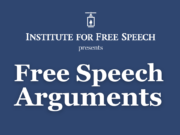Patent falsehoods? Absurd rhetoric? These are hallmarks of those who are trying to convince Americans that we need to amend the First Amendment so that politicians can decide what limits they can impose on our right to associate and speak about politics.
We’re not the ones claiming that this amendment is necessary to overturn a Supreme Court decision that held that the government could not ban movies or books that speak about a political candidate, and then claiming that this amendment has nothing to do with banning books or movies. Doing so would be intellectually dishonest.
We’re not the ones claiming that billionaires are “buying” elections or “subverting” democracy just because they can afford to run political advertisements. We know that Americans don’t just vote for whichever candidates the TV tells them to.
Supporters of the proposed amendment constantly harp that it is necessary to tamp down on the influence of a few, but, since laws in this country are applied to all, this amendment will impact any group of individuals who want to get together and associate politically. In this case, the over the top rhetoric serves as a red herring from the ugly truth that this amendment is designed to police speech – everybody’s speech.














